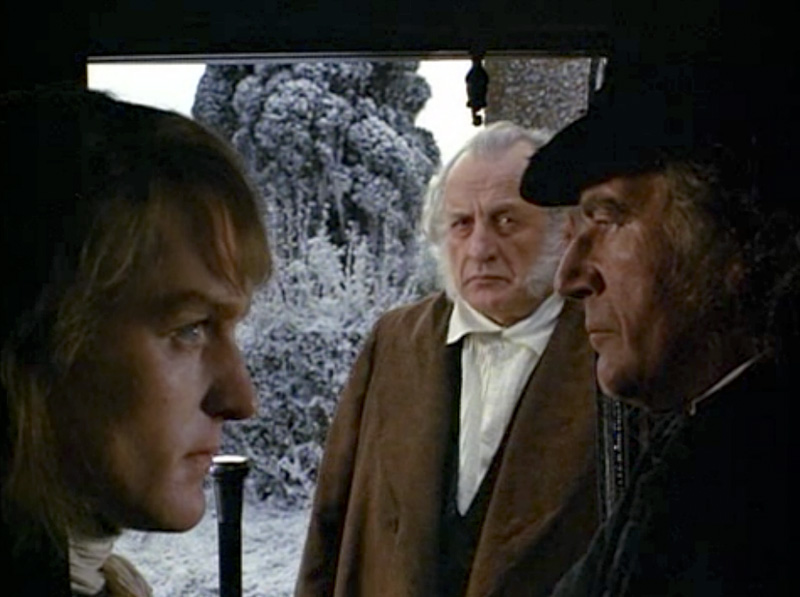Scrooge (George C. Scott) looks on as his younger self (Mark Strickson) sits opposite his cold father (Nigel Davenport) in the confines of a carriage, in Clive Donner's 1984 version of A Christmas Carol‘God Forgive Me For The Time I’ve Wasted’
George C. Scott: The Definitive Scrooge
By David McGee
A CHRISTMAS CAROL
Directed by Clive Donner
Starring George C. ScottWith Nigel Davenport, Frank Finlay, Lucy Gutteridge, Angela Pleasence, Roger Rees, David Warner, Edward Woodward, Susannah York, Timothy Bateson, Derek Francis, Michael Gough, Caroline Langrishe, John Quarmby, John Sharp, Joanne Whalley, Peter Woodthorpe, and introducing Anthony Walters as Tiny Tim
1984, Color, 100 minutes
20th Century Fox Home Entertainment, 1999Complaints about the Clive Donner-directed version of A Christmas Carol, introduced on television in 1984, center primarily on George C. Scott's barely discernible English accent as Ebenezer Scrooge, the definitive Christmas humbug. If you're paying attention to his accent, you're not paying attention. Scott's physical presence, his withering disdain for making merry on December 25, the delight with which he expresses his disgust at charity and forbearance, and the slow transformation, via the helping hands of a three spirits taking him on a journey through his past, present and future, from misanthrope to a man who, finally, "knew how to keep Christmas well, if any man alive could be said to possess the knowledge," is revelatory. The scenes of him viewing the shy, ambitious--and neglected--motherless child he was, befriended only by his "beloved books," as awkward at romance as he was focused on his career, are achingly poignant; his anguish over his eventual fate of being forgotten and unloved upon his death, is depicted as much in his physically tortured response to the chilling visions wordlessly conjured by the Ghost of Christmas Yet to Come as it is in his emotion-wracked pleadings for guidance. Similarly, his giddiness when he emerges from Christmas Eve a changed man is heartwarming. The rest of the cast is superb, especially Frank Finlay as the "dreadful apparition" Jacob Marley; David Warner as the sturdy, obedient Bob Cratchitt; Susannah York as the loving Mrs. Cratchit, whose Christian charity deserts her upon the mention of Mr. Scrooge's name; Lucy Gutteridge as Belle, the charming, sweet voiced apple of the young Scrooge's eye who could not compete with his work; and all three ghosts, so strikingly portrayed (Angela Pleasance as a somewhat wistful Ghost of Christmas Past, the jovial Edward Woodward as a Ghost of Christmas Present both benevolent and acerbic, and Michael Carter, cloaked and silent, as the unforgiving Ghost of Christmas Yet To Come). Not least of all, marvel at Anthony Walters, making his film debut, is a Tiny Tim for the ages, his limpid eyes, baby face, sweet demeanor and chirpy voice tailor made to move the heart of even the most Scrooge-like viewer. But great Scott--though Alastair Sim gives a wonderful portrayal of Scrooge in the 1951 Brian Desmond Hurst-directed version of A Christmas Carol, Scott's Scrooge fills the screen initially with the intensity of his scabrous denunciations of the Yuletide, and later with the ebullience with which he greets his second chance in life.
Scrooge Transformed: the final scene of ‘A Christmas Carol,’ starring George C. Scott as Ebenezer Scrooge and David Warner as Bob Cratchit. Closing credits roll to the tune of Nick and Tony Bicat’s outstanding original song, ‘God Bless Us Every One.’Director of photography Tony Immi makes all the right moves in capturing the corrosive ambiance of Scrooge's cold office in dark, drab colors, the ennobling love of the Cratchitt family that suffuses their humble home in warm, bright light, and picture postcard scenes of a snowy old London town in a slightly gauzy haze. Special effects are employed judiciously to make the ghost of Marley, for instance, suitably spooky in all his translucent, blue-skinned, shackled menace, and to render the portentous silence of The Ghost of Christmas Yet to Come more malevolent than words could articulate.
Not least of all, for this production Tony Bicat (lyrics) and Nick Bicat (music) composed "God Bess Us Every One," a wonderful new carol with a cheery melody and hopeful lyrics that succinctly state the story's theme and spirit. Parts of it are sung by street singers throughout the film and in full as the end credits roll. "So grant us all a change of heart/Rejoice for Mary's son/Pray peace on Earth to all mankind/God bless us every one," is its closing sentiment. Truly, what more to say?
A Christmas Carol starring George C. Scott and directed by Clive Donner is available at www.amazon.com
Founder/Publisher/Editor: David McGee
Contributing Editors: Billy Altman, Laura Fissinger, Christopher Hill, Derk Richardson
Logo Design: John Mendelsohn (www.johnmendelsohn.com)
Website Design: Kieran McGee (www.kieranmcgee.com)
Staff Photographers: Audrey Harrod (Louisville, KY; www.flickr.com/audreyharrod), Alicia Zappier (New York)
E-mail: thebluegrassspecial@gmail.com
Mailing Address: David McGee, 201 W. 85 St.—5B, New York, NY 10024



